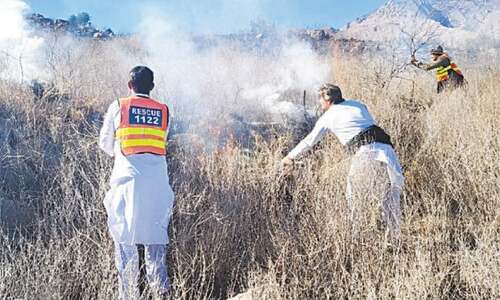PESHAWAR: Scheduled withdrawal of Nato forces from Afghanistan and uncertain situation there have raised doubts about the voluntary repatriation of Afghan refugees from Pakistan during current year.
Only 31,800 of the total 1.6 million registered Afghans have returned to their country since January last, said officials of United Nations High Commissioners for Refugees and Afghan Commissionerat at a workshop on Monday.
The officials blamed the decline in repatriation of refugees on the forthcoming pullout of Nato troops from their country.
Afghan Commissionerat organised a policy workshop to discuss ‘Solution Strategy for Afghan Refugees.’
Commissioner Refugees Mohammad Fahim Wazir, officials of the Afghan Ministry of Repatriation and Rehabilitation, tribal elders and refugee students attended workshop.
Khyber Pakhtunkhwa hosts 900,000 registered refugees, but only 16,250 Afghans left for their country in 2013, which is the lowest figure compared with the last few years.
Member countries of Nato have planned the complete withdrawal of their troops from Afghanistan in 2014.
“There is uncertainty in Afghanistan and the number of returning refugees may go down further next year because of the scheduled withdrawal of Nato troops,” predicted Mohammad Bashir, head of repatriation wing at UNHCR sub-office in Peshawar.
He, however, said there were still many Afghan areas, where environment for the return of refugees and investment was conducive.
Mr Bashir said donors had shifted their focus to Syria and other conflicted-ravaged countries in Africa causing shortfall in donations for Afghan refugees. Donors, he added, might not continue assistance for Afghans in future.
He said the UNHCR had also reviewed its return package for refugees and every returnee would now receive $200 after returning to his home country.
The UN agency has paid $150 to every refugee during the current year.
The UNHCR representative said his organisation was introducing group return programme to facilitate more and more refugees to return to their country.
He also highlighted problems being faced by Afghans after returning to Afghanistan, saying 400,000 Afghans had submitted applications for allotment of land of which only 20,000 were entertained.
Mohammed Bashir said 80 per cent of integration centres set up by the Afghan government inside the country had failed.
He said the Pakistani government was discussing a plan with International Organisation of Migration to facilitate return of undocumented Afghans to their country.
Additional Commissioner for Refugees Waqar Maroof said the declining number of the Afghan refugees returning to their country was a matter of concern as the federal government had fixed Dec 2015 as the deadline for the return of all registered refugees.“This is the last extension for refugees and there will be no relaxation,” he said.
Mr Waqar said two committees had been set up at the federal and provincial levels to complete repatriation of refugees by the end of 2015. He said renewal process of Proof of Registration Cards would begin from Feb 3, while it would be completed in one month.
Dr Alozai, representing Afghanistan in the workshop, said his government’s strategy for the post-repatriation integration of refugees after return had failed.
He said the strategy could not produce the desired results and that Afghan refugees might be shifted to another country after 2015.












































